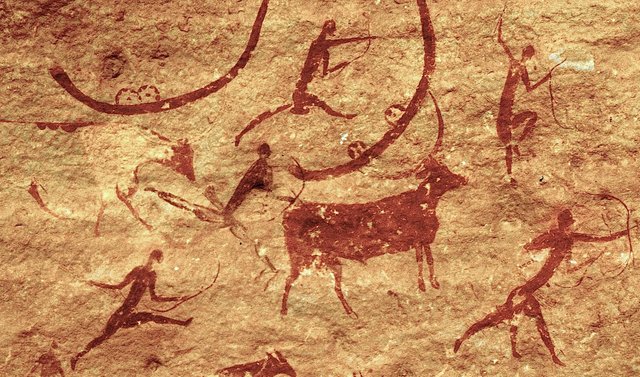Fire - A Case Study in Technological Dependency
Inspired by @surfermarly's recent post, I want to write a little bit about technological dependency.
The Fire Revolution
When looking back at history we constantly talk about the major technological revolutions, because of the enormously broad impact they had on human civilization. The Industrial Revolution is the biggie, but we also have the Internet and Social Media revolutions more fresh in our minds, and even the industrial revolution was dependent on prior agricultural revolutions (of which there were many).
Fire was one of the first technological revolutions. It certainly preceded agriculture by many thousands of years, and likely preceded the earliest animal domestication. Tool use is older by millions of years, but fire led the way for almost everything we can call "technology" that exists today.
Fire Made us Dependent
One thing that is interesting about fire is that it very quickly made us dependent on it. Fire was primarily used in the cooking of food. Killing off bacteria meant that we did not need to rely on our own immune system as much to fight off hostile microscopic organisms when we ate. It is possible that early hominids could have become dependent within a single lifetime, but more likely it took a few generations to be truly dependent on cooked food, where our immune systems lost the capacity to fight infections from raw or undercooked food, especially meat. We shouldn't dismiss this dependency, under the wrong conditions and without access to the right items, it can be very difficult to start a fire. Dependency upon it can be a serious concern.
It is conjecture but seems reasonable to assume that not all hominids of the time adopted the use of fire. Whether due to carrying on existing habits, fear of change or simply not having access to the technology, many would have continued to eat food raw as they always had before. In doing so they avoided a dependency upon a technology which may not have always have been available. Yet we know now that they were not the successful ones. Undoubtedly they contribute to our genes today, but by the time other technological revolutions were occurring, everyone ate cooked food, everyone was dependent upon it.
Those who Became Dependent, Flourished
The ability to cook food didn't just mean avoiding sickness from bacteria etc., which our bodies did already have the capacity to fight off. More importantly, it meant that we could extract more energy and nutrition from eating the same amount of food, because cooked food is much more energy efficient to digest. Uncooked food * requires that our body spends more energy breaking it down before we can extract the benefits. Early hominids therefore had larger stomachs in order to facilitate eating more food, to get the energy that they needed. Those who ate cooked food, needed less food to survive. They could also carry around food for longer without spoiling, so you could cook one animal and proceed with the next hunt very soon. Over generations, the stomachs of those who cooked food became smaller, and the human body was able to become fully upright. With a fully upright body, and food that could be carried, early humans were able to engage in endurance hunting, where an animal was tracked and pursued for days. This was an extremely successful way to hunt, because no animal could compete with that level of endurance. They would tire out and be weak enough to kill by the time the human hunters finally caught up with them. Yet with smaller stomachs, they were even more dependent upon fire.
There are none remaining of the hominids who did not use fire. All modern humans have the small stomach and upright posture of those who did.
Technological Dependency and Empowerment are Two Sides of the Same Coin
Every time we adopt a new technology, we abandon the more rudimentary way we achieved the same goals in the past. Almost always, this means we become dependent in some way. And it is those who embrace dependency, who are empowered to do things better. The lesson with fire has repeated over and over throughout history. The old ways die out, and it is sad, but it is sadder to cling to the old ways, and die out with them because you did not want to be dependent. On the bright side, today we have better ability to retain the knowledge of the older ways, but we should not cling to them in such a way that prevents the empowerment that new technologies bring.
* usually, it's not a hard rule


Very thought-provoking post, excellent! And thanks for the mention in the beginning :-)
I've never thought about the importance of fire in human history to be honest. It has become so evident that we forget that there was a time when it wasn't.
I fully agree on what you said about the correlation between dependency and empowerment. However, I'm still not sure how a dependency to things like Snapchat may empower us "to do things better" as you said.
I'm totally with you when it comes to technological revolutions in the sector of medicine, science, research, construction, transportation or whatever non-interpersonal field.
Yet I believe that technology won't ever be able to replace personal relationships, face to face situations, real life encounter, interpersonal communication, emotions, feelings.
You may do a million facetime conferences, skype chats or whatever real time streamings. They won't ever be as powerful as one single meeting in person.
That's where technology can't provide empowerment... and that's why all steemians still talk about November 2016 (steemfest) :-)
The implications of new technology are never clear at the outset.
The kids using snapchat "pictures as speech" are communicating in a way that conveys more information accurately in a faster time. If it wasn't, they wouldn't be doing it. How this will play out, I don't know, but it is clearly a powerful way to communicate and we will see the impact that power has over time.
Good point. I agree on accurate and fast though :)
BTW, I don't use Snapchat either. After writing what I wrote, I'm afraid that I'm already an old fuddy-duddy at 32 and I'm worried just how out of touch and left behind I will be by 50 O.o
Haha, I'm 36 so tell me about it :-D
That was a really thought provoking post. I occasionally practice a few bushcraft fire-lighting methods but it never occurred to me to 'look deeper into the fire' until I read your post. Thanks.
What an excellent post! I love the story of it! We are really dependent on fire and it can be quite hard to make a fire without the proper tools. I think everyone that spends time in the outdoors should try to make a fire using a bow drill to learn to appreciate it a bit more. :)
Very nice analysis. I think every new technology should always be taken with a grain of salt but not as much as to be really pointlessly clinging to the old ways. Constantly increasing dependency upon the ever expanding technology has it's dangers and risks, but it seems that the benefits outweigh them significantly. So yes, let's not be too clingy about the old ways and let's embrace the technologies that are making our lives and future as a species better.